Photographs: Jason Reed/Reuters Aziz Haniffa in Washington DC
Secretary of Commerce Gary Locke, who was by President Barack Obama's side throughout his visit to India in November, is a third-generation Chinese American. He was the first Asian-American chief executive of a state in the United States mainland, when he served as the governor of Washington state from 1997 to 2005.
He is also the first Chinese-American secretary of commerce, and the third Asian American in Obama's cabinet, along with Energy Secretary and Nobel Laureate Steven Chu and Veteran Affairs Secretary Eric Shinseki.
In an exclusive interview with Rediff India Abroad in his expansive office at the Department of Commerce, Locke spoke about a wide range of issues from his upcoming trade delegation to India to the contentious bilateral issues with India, from whether a Free Trade Agreement with India is a pipe dream to the Indian-American community's contributions.
 |
What was it like accompanying President Obama on his visit to India and being by his side through what many believe was a transformational trip?
It was just a terrific and amazing trip, and it was not an accident that India was his first stop on his trip throughout Asia. It really highlights the importance that the President and America places on the relationship with India as a very large democracy, a country with amazing progress, a highly educated population and doing a lot to raise the quality of life and the standard of living for the people of India. Of course, it has enormous challenges still, but India is a model of growth and innovation for the entire world.
When you were governor of Washington state, you obviously had interactions with the Indian-American community, particularly the entrepreneurs and information-technology professionals, who I know always wanted you to lead a trade delegation to India, but you were never able to make it. But here you were accompanying the President as commerce secretary on your first visit to India on a trip where pushing for increased US-India trade and commerce was a major priority!
After having accompanied the President to India and yes, for me, my first trip I regret it has taken me so long to finally visit India and I only wish that I had been able to go many years ago and actually to see and therefore mark the transformation and the progress within India.
But it was a big thrill. I watched all the television newscasts and they were playing it over and over again for 24 hours all throughout the days for many days, covering all of his speeches and the reactions from the people throughout India, from the people on the street, the school kids, the business leaders and government leaders and the reactions were all so overwhelmingly positive.
And, you could tell that the President and the First Lady very much enjoyed themselves the dancing the First Lady engaged in, to the question and answer period that the President had with the college students, to visiting many of the historic and memorial sites throughout India and the huge reception that he received in the parliament, the dinners with the prime minister and also the President it was all just such an amazing experience.
'Obama visit will create immediate jobs in India'
Image: U.S. Secretary of Commerce Gary Locke (L) shake hands with Anand Mahindra during a meeting between U.S. President Barack Obama and other entrepreneurs in Mumbai, India, November 6, 2010.Photographs: Jason Reed/Reuters
That you, (Agriculture) Secretary Tom Vilsack, and US Agency for International Development Administrator Raj Shah accompanied the President was a clear manifestation of the priority he has attached to US-India commerce and trade, agriculture and development. How much would you say was achieved in terms of tangibles?
I believe we came away with very tangible results and with benefits to both the people of India and the US. What the President was able to achieve was great progress in areas that are mutually beneficial to the people of both India and the US.
And these are the types of partnerships and trips that we seek mutually beneficial arrangements. And, of course, on the US side, very tangible results of $10 billion of exports of American-made goods and services, which will support some 50,000 jobs here in the US and these products will help raise the standard of living and the quality of life and enhance the security of the people of India.
In terms of benefits on India's side, obviously the agreement on export controls, which recognizes that India will soon hopefully join the various multilateral regimes that control exports and also will enable the sale of very high technology goods to India, as requested and desired by India. So, India was able to achieve many of their top priorities from this visit and so did the US.
 |
But won't all of these tangibles for all the hype, and as some said the President went as a salesman-in-chief and started speaking of all the sales and contracts and jobs it would generate, obviously to play to the domestic audience here take years to translate into real jobs?
A lot of the items that were announced, for instance the agreement the announcement by Harley Davidson that it will be selling motorcycles into India, those will create immediate jobs in India because those motorcycles made in the US will go to India in pieces and they will be assembled by workers in India into completed motorcycles.
They will be serviced, maintained by trained mechanics within India. So, that is an example of a tangible that presents enormous job opportunities for the people of India. And, the same thing with the sale of various aircraft, Boeing airplanes and things like that. All of that will be serviced and maintained by people within India.
I was also asking about generating jobs here in the US in terms of these agreements creating job opportunities almost immediately?
Absolutely. And, that's why I say these are mutually beneficial, win-win trade deals that are going to be generating thousands of jobs for both countries.
'Changes in Entities List will hasten India's innovation industry'
Image: A McDonald's outlet in Banglore.Photographs: Sanjay Sawant/Rediff.com
One of the major irritants that peeved India for years was having its major entities like the Indian Space Research Organisation and the Defense Research and Development Organisation removed from the Department of Commerce's Entities List. That the US acquiesced to the Indian request and this was one of the major priorities that India achieved during President Obama's visit, how significant will this be in terms of future US-India commerce and trade?
Enormously significant it would make a tremendous impact and difference. The Entities List had made it much more difficult for these organizations to receive high-tech American goods and so the entire agreement will advance greater research and development within many of these organizations using very high, sophisticated technological goods from the US. And, of course, it will hasten the innovation industry within India.
You mean, for example, like ISRO in terms of its collaborations with the National Aeronautics and Space Administration, because it was ironic that though they were partnering together in launching satellites and payloads, ISRO by being on the Entities List couldn't receive dual-use or US high technology for its research and development purposes.
 |
Absolutely. And, a lot of those partnerships on space and things like that will not only benefit India and the US, but the entire world.
Besides the big ticket items like the C-17, C-130 military aircraft sales to India, what would you be concentrating on to double US exports to a country like India in the next five years? How will you harvest the goodwill of the President's visit in terms of trade and commerce?
As you know, I will be leading a trade mission in early February to India focusing on high technology and will also be bringing with us medium- and small-scale enterprises in addition to the larger corporations. We will be focusing on partnerships and collaborations on research and development, whether it's in clean energy, whether it's in smart grid.
There is a great deal of knowledge and technology already occurring within India and we have an opportunity now to blend and partner between India and the US and create even more advanced goods and products that can be sold to the entire world. So, we have an opportunity to really join forces to supply these high technologies to India to perfect and continue to innovate these technological goods and then to supply them throughout the world.
'I am bullish about the improved US-India business ties'
Image: U.S. President Barack Obama greets members of the audience after delivering remarks at the U.S.-India business council and entrepreneurship summit in Mumbai, India, November 6, 2010. Obama announced $10 billion in business deals on Saturday as he arrived in India to boost U.S. exports and jobs after a mauling in mid-term polls.Photographs: Jason Reed/Reuters
In addition to the Fortune 500 firms, are there going to be a good number of small and medium scale enterprises in your delegation? How large a delegation will it be?
Yes, there will be several small and medium enterprises in the delegation and we are looking at approximately 70 companies in total. A good number, if not a good percentage of those will be medium and small companies.
Is it going to be a delegation where you expect to cut deals or one that is merely symbolic following the President's visit? How focused and concentrated is it going to be?
 |
Every trade mission that I've participated in or led, whether as governor or commerce secretary, has really focused on business development mutually beneficial business development. Very little sightseeing. Almost no sightseeing.
So, the focus is to make further inroads into India's markets and try and double exports as per the President's directive?
Exactly. And, exports have already grown substantially. US exports to India have grown substantially over the last several years and there's so much that America makes that's in high demand and highly valued in India.
And, of course, we also benefit from the We are very proud of the large number of people in India that come to the US to study, but also to live and who are now leading companies and pioneering new technologies and innovations constantly.
How bullish are you about a bilateral investment treaty with India?
Some of those things are being worked out by the US trade representative, but I am very, very optimistic and bullish about the improved US-India business relations. I had an opportunity to co-chair the US-India CEOs Forum and of course, the President and the (Indian) prime minister met with this group of CEOs.
These CEOS actually, both on the Indian and the American side, raised to both governments the very key issues and concerns that they have about improving the business climate both to support enhanced trade between the US and India and they are able to identify those things that they think both governments should work on immediately.
So, both governments benefit from their observations and their day-to-day business experiences and both the prime minister and the President and myself take those observations to heart.
'We are very pleased with the ability of US companies to grow in India'
Image: U.S. President Barack Obama meets members of the audience after delivering remarks at the U.S.-India business council and entrepreneurship summit in Mumbai, India, November 6, 2010. Obama announced $10 billion in business deals on Saturday as he arrived in India to boost U.S. exports and jobs after a mauling in mid-term polls.Photographs: Jason Reed/Reuters
India's Commerce Secretary Anand Sharma, while addressing a conference along with you on the sidelines of the President's visit, had spoken of initiating negotiations for a comprehensive economic partnership agreement with the US, but reports said you didn't seem very enthusiastic about such an agreement. Why?
Oh, no, I am very supportive of improving our working arrangements, so I can't say that I am I am not sure that I said or that I am not enthusiastic.
But what we were talking about is focusing on very specific areas and agreeing among ourselves on initiatives and work plans to address those very specific trade topics, and I am very much in favor of looking at ways in which we can improve our trade relationship looking at these very specific issues that the companies in India have about investment opportunities in the US and exports from India to the US. And the same thing from the US going to India.
 |
It was also reported that you had referred to India's foreign direct investment rules as complex, non-transparent and barriers to trade that would adversely affect long-term US-India trade and commerce. What would you want India to do to alleviate this so that the envisaged US-India strategic partnership can be cemented?
First of all, we are very pleased with the ability of US companies to invest in India, to grow in India, to sell their products and services in India. As I have indicated, US exports to India have grown substantially over the last several years as well as exports from India to the US and even direct foreign investment by Indian companies into the US.
The issue is how can we make it even more robust and even stronger.
And, if we want even more trade, and if we want more US companies to invest in India selling their products, which will then be assembled and partially manufactured in India, which then creates jobs for the Indian people, if we want US companies to establish operations in India, and bring in their capital, their money to India, whether it is building roads and bridges and helping finance a lot of these projects that are beyond the capability of the Indian government alone, then US companies and other foreign companies are going to be looking for just greater predictability in how projects will be.
How companies will be chosen to carry out the various projects. How the decisions are made, what the bidding requirements are. People simply want more clarity, more consistency in application and greater certainty.
They want a level playing field. They understand that they have to complete against companies in India and companies from other places around the world, but they need to know what the standards are, what the criteria are, up-front very clear, very transparent.
'We will eventually have a free trade agreement with India'
Image: Inmates attend a training session for a business process outsourcing (BPO) centre located at the Cherlapally Central Jail on the outskirts of the southern Indian city of Hyderabad December 14, 2010. The jail authorities have so far selected 50 inmates on the basis of their educational qualifications and typing speed for the BPO unit, superintendent of Cherlapally Central Jail Gaddam Jayavardhan said. The telephone and internet facilities will not be provide inside the outsourcing centre and the prisoners will be dealing with data entry and other functions of BPO with the help of a private organization, Jayavardhan added.Photographs: Krishnendu Halder/Reuters
Is it too early or even practical to think about a Free Trade Agreement with India?
I believe there are many things going on that are leading up to eventually a trade agreement with India and that's why we have the US-India CEO Forum.
That's why Minister Sharma and I have been having discussions about very specific issues that prevent more trade between our two countries and how we can correct those problems and address those challenges.
But I think ultimately and especially if we have the Trans-Pacific Partnership, which is designed and being worked on now as a new standard for dealings for the entire Asia-Pacific region I think that holds great promise.
The nuclear liability law passed by the Indian parliament has been of much concern to US business and industry and India has made clear that there will not be any change to this law. How do you intend to sort this out because after all it was US business and industry that went to bat for this deal in Congress?
 |
I am not an expert in this area, but I can just tell you that US companies and companies from other parts of the world do have some concerns as to whether or not the Indian law complies with some of the international standards and they need that certainty in terms of liability and to ensure that the provisions of the Indian law are consistent with the international standards before any foreign company will want to participate in nuclear projects in India.
My understanding is that the Indian government feels that the law does in fact comply, so it could be a matter of interpretation and application. So, I think we've got to leave it to the international legal experts to decide whether or not the Indian law is adequate.
With the current economic malaise and the huge unemployment in the US, the outsourcing bogey was front and center during the mid-term elections and seems to be continuing as a contentious issue. Indian business and the Indian government have decried that and the increase in visa fees as protectionist measures. At the same time, there is a significant amount on in-sourcing going on with Indian companies not only investing in the US, but buying US companies that there were on the verge of bankruptcy and not just generating jobs, but saving thousands of jobs. Is there a message being lost here in terms of the outsourcing controversy vis- -vis the Congress and is outsourcing really a non-issue as the President said in India?
As the President was trying to indicate, it's certainly much more complex than campaign slogans make it out to be, and that there are so many different facets of it that And many facets of the global economy actually benefiting the US and the workers of the US. So, the President was saying that we've got to get beyond slogans and really understand what's happening and appreciate the fact that Americans benefit from the many aspects of this global economy.
'The challenge is to lower barriers around the world'
Image: Infosys campusPhotographs: Rediff Archive
But when it becomes an issue and gets debated in Congress and India becomes sort of the whipping boy of outsourcing, are you guys willing to say, 'Look here, Indian companies are investing here too and have bought up American companies and they have generated more than 330,000 jobs'? Isn't it in some ways incumbent upon the administration to go and argue that point up on Capitol Hill, particularly when for example on the visa issue, you had the likes of Senator Chuck Schumer describing a venerable Indian company like Infosys as a chop-shop? Why didn't the administration go to bat for India? Was it because it was politically expedient at the time? So, isn't it incumbent that the administration in some ways has got to put the record straight?
 |
The administration has been trying to get the record straight and we may have missed a couple of statements here and here.
But I can tell you that the President was very concerned about that law that was passed and that affected the visas and the workers coming in from India and other countries and that's why the President has long talked about avoiding protectionist measures and how we are so inter-connected as a world and that we want to be open as a country for investment and also for people to come to work here and that we want reciprocal arrangements elsewhere around the world.
And, that the challenge is to lower barriers around the world, not raise barriers.
Not to belabor the point, but is outsourcing now a fact of life in a globalized world?
Again, by using the word outsourcing, we are implying a negative connotation. But outsourcing really has many, many other facets to it, and so the fact that US companies and the fact that multinational companies have operations throughout the world, in is fact a fact of life in this 21st century economy.
Because you are not going to make milk or you are not going to manufacture toothpaste economically in the US and ship it to, to sell it to other people around the world. A lot of the stuff that American companies are making overseas is to serve customers overseas and that's very different from making things overseas and bringing it back to the US for consumption. So, we are really meetings the needs of the marketplace in that particular country.

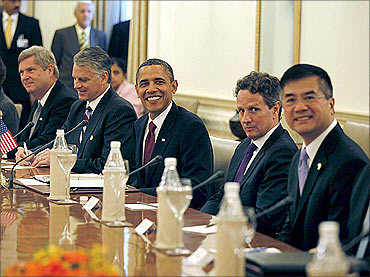
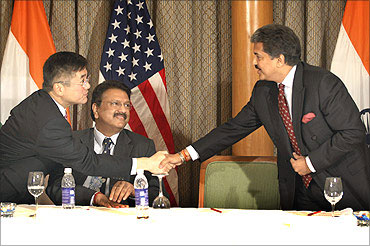


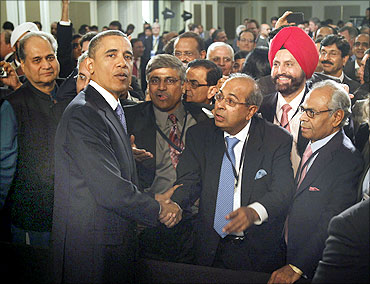
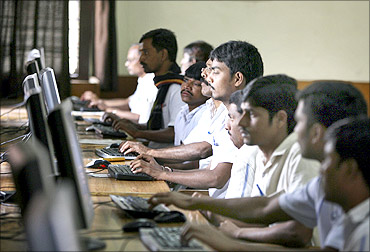
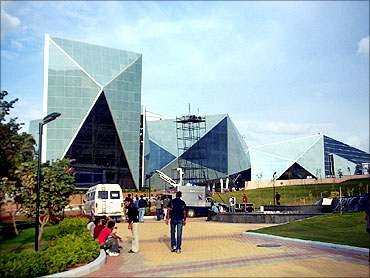
article